- Home
- Lucy Gillen
Means to an End
Means to an End Read online
MEANS TO AN END by LUCY GILLEN
Alison and Danny couldn’t get married unless they had some of Alison’s money — but it was all in the hands of her trustee, Stefano Illari, who wouldn’t part with it. Alison knew she would somehow have to get on the right side of Stefano, but she disliked him so much. How could she possibly manage it?
PRINTED IN CANADA
Harlequin Romances by LUCY GILLEN
1383—A WIFE FOR ANDREW 1408—THE SILVER FISHES
1425—GOOD MORNING, DOCTOR HOUSTON
1450—HEIR TO GLEN GHYLL 1481—NURSE HELEN
1507—MARRIAGE BY REQUEST 1533—THE GIRL AT SMUGGLER’S REST
1553—DOCTOR TOBY
1579—WINTER AT CRAY
1604—THAT MAN NEXT DOOR 1627—MY BEAUTIFUL HEATHEN 1649—SWEET KATE
1669—A TIME REMEMBERED 1683—DANGEROUS STRANGER 1711—SUMMER SEASON
1736—THE ENCHANTED RING 1754—THE PRETTY WITCH 1782—PAINTED WINGS
1806—THE PENGELLY JADE 1822—THE RUNAWAY BRIDE 1847—THE CHANGING YEARS
1861—THE STAIRWAY TO ENCHANTMENT 1877—MEANS TO AN END
Many of these titles are available at your local bookseller, or through the Harlequin Reader Service.
For a free catalogue listing all available Harlequin Romances, send your name and address to:
HARLEQUIN READER SERVICE M.P.O. Box 707, Niagara Falls, N.Y. 14302
Canadian address: Stratford, Ontario, Canada. or use coupon at back of book.
Original hard cover edition published in 1972 by Mills & Boon Limited.
© Lucy Gillen 1972
ISBN 373-01877-0
Harlequin edition published May 1975
All the characters in this book have no existence outside the imagination of the Author, and have no relation whatsoever to anyone bearing the same name or names. They are not even distantly inspired by any individual known or unknown to the Author, and all the incidents are pure invention.
The Harlequin bade mark, consisting of the word HARLEQUIN and the portrayal of a Harlequin, is registered in the United States Patent Office and in the Canada Trade Marks Office.
CHAPTER ONE
ALISON GRAY sat hugging her knees and gazing out at the calm, sun-warmed face of the sea below her. From her place on the very top of Creggan Head she could see for miles, and the view never failed to enchant her, no matter if she had lived within walking distance all her life.
What looked like an incredibly long way down, and to her left, Creggan Creek poked its long, shiny grey finger inland, curving round to encompass Tulley’s Bend and the cluster of little houses that looked just as if someone had painted them there against their background of green.
Right from the point above which she sat, round as far as she could see, Creggan Bay curved in a wide, glittering sweep, holding in its arms the yellow-sanded beaches, barely licked by the rippling calm of an incoming tide, and the twin resorts of Leethorpe and Skarren, looking much more beautiful in the evening heat haze than they did in closer reality.
Alison sighed and shrugged her shoulders, a gesture meant to dismiss the realisation that Creggan Bar lay no more than fifty yards behind her on the wide, windswept headland. Standing in splendid isolation like an ancient fortress against the pale blue of an early summer sky, it could look mellow or grim, according to the prevailing elements.
Alison’s great-grandfather had built Creggan Bar as a rather ambitious monument to his business
success, and with the grand idea that he was establishing a dynasty of Grays in this wild and beautiful part of the coast, but his dream had received its first blow when his only son was killed at the very end of the first world war.
His grandson; also an only child, married fairly late in life, but the old man had once more cherished his dream when a child was expected, and Alison had never been left in any doubt that she was a bitter disappointment to him because she was not a boy. The final and shattering blow had come when, less than two years after Alison was born, her father was fatally injured in a train crash, reducing the Gray dynasty, by which he had set such store and made such plans for, to one small girl.
True, the old man had married again, an Italian widow with whom he had apparently been quite happy for a time, but it was much too late in life for there to be other sons and he had died six months ago, a bitter and unhappy man, and not even asking to see his great-granddaughter.
He had been an immensely wealthy man, although he had lived almost frugally for the past few years. Just how wealthy had not been realised until the will was read and all his assets accounted for. It was then discovered that he had left only half his vast fortune to his widow, and the rest divided equally between Alison and his stepson, Stefano Illari.
It had been something of a surprise to Alison to find that he had left her anything at all, for the old. man had never shown any interest in her during his lifetime. That he had made her co-heir with his
stepson, she could better understand, for Stefano Illari was possibly the nearest he had ever come to leaving a son to follow him.
The one drawback to the inheritance as far as Alison was concerned was that her share had been left in trust, to be administered by his stepson, so that for the rest of her life she would always have to apply to Stefano lllari. It was a situation that she found almost unbearable at times, and it had been because of a fruitless request for money that she had come out here to sit alone with her anger and frustration.
The ensuing quarrel had been bitter and angry, mostly on her part, she had to admit, for Stefano seldom lost his temper. Not for the first time she almost regretted coming to live at Creggan Bar, although usually she loved being there.
The house was half hers, and she had made up her mind that she would live there. That he had also decided to do the same had been not only a surprise but rather annoying too, but she had overcome the more obvious difficulties by inviting a widowed. aunt to come and stay there too, as a sort of chaperone—a move that seemed to amuse her co-heir.
She was furious now that he had refused to consider her request for several thousand pounds, and she had come out to sit on Creggan Head, vowing violence against the man who had thwarted her plans, hers and Danny’s. Aunt Celia liked Danny and she had been quite pleased when Alison announced her intention of marrying him. Unfortunately for Alison, however, Aunt Celia liked Stefano
Illari even more than she did Danny, and instead of support for her plan, as she had expected, Alison had found her hoped-for ally siding with the enemy, declaring herself not in favour of so much money being handed over so casually.
It had all seemed so simple when she and Danny had talked about it, planned it in every detail and decided it was just right for them. Danny Clay was the son of an old friend of her mother’s, and he and Alison had known each other since schooldays, although it was rather an erratic friendship. They had taken little notice of one another until about eighteen months ago when Alison’s aunt had given a twenty-first birthday party for her, and Danny had been among the guests.
He had been flatteringly attentive the entire evening, vowing that she was much more beautiful since the last time he had seen her three years before, when he had gone away to university. Without doubt she was a very lovely girl, with short, curly dark hair and blue eyes as wide and guileless as a child’s, fringed with dark lashes that gave them an attractive, smudgy look. If she was below average height, her figure was so beautifully proportioned that it was as eye-catching as the rest of her. She was used to being admired, but somehow Danny Clay had struck a responsive chord in her, and since the party they had seen each other quite frequently.
Then, three weeks ago, Danny had asked her to marry him. He had been nervous and a little humble, because he said he
had not much money and they would have to live quite poorly for a while at least. But he had plans for opening his own
garage in time, and then everything would be all right.
Of course Alison had insisted that she could more than afford to buy the garage for them now, and what was hers was his. Danny had objected at first, saying that he could not possibly allow her to spend her inheritance on him, but finally he had allowed himself to be persuaded, and Alison had gone to Stefano Illari with high hopes.
Until now, she had to admit, he had been fairly easy to persuade when she had asked for money. Nine times out of ten he had made no demur at all and she had had what she wanted, although she hated having to ask for it. Now, however, when it was so very important to her and Danny, he had refused to let her have the amount she asked for, and had even inveigled Aunt Celia on to his side.
She hunched her knees up under her chin and tried to think of ways and means of outwitting the Machiavellian holder of her purse-strings, but could think of nothing. If only he would decide to go back to Italy, as his mother had done ! Perhaps at long distance he would prove less unbending. Maybe in the softer clime of his own country he would mellow —he might even fall in love and marry, and that might soften him, make him more ready to see her point of view.
Impatiently she shook off such daydreams. After three months of living under the same roof as Stefano Mari she doubted if he was capable of ,mellowing at all, and particularly not to the idea of love and marriage. He was insensitive, callous, and quite indifferent to anyone’s comfort but his own-and she hated him.
A glance at her watch showed it to be just about six o’clock and dinner was in less than half an hour, but she was prepared to suffer the pangs of hunger that were already gnawing at her empty stomach, rather than sit down to dinner with him. Aunt Celia, she hoped, would understand how she felt. After all, if a grown woman of more than twenty-two could not assert her independence now and again, things were coming to a pretty pass.
It was almost twenty minutes to seven when she finally decided that her independence had been asserted sufficiently to allow her hunger to be appeased, and she got up from the warm softness of the turf and brushed down her frock, running careless fingers through her short curly hair before setting off for the house.
If she looked illused enough, Mrs. Dawlish, the cook—housekeeper, would surely find it in her heart to give her dinner in her room. She was a kindly soul, and quite fond of Alison, although she too was very obviously taken with the dark charms of her employer.
The whole of the fifty yards or so to the house was uphill and she knew that if Stefano and Aunt Celia were having dinner they would see her coming, for the wide, high windows of the dining room gave a perfect view down the grassy slope to the sea. It was instinctive, therefore, when she lifted her chin in a gesture of defiance as she walked across the sloping lawn to the house, feigning not to notice the two figures, quite plainly visible, in the white-walled dining room.
She opened the door and went through into the cool stillness of the house, blinking for a moment to clear the blurring sun from her vision. The stairs were to her right, and the dining room door immediately to her left as she came in, and she noticed that the door was slightly ajar.
One hand on the newel post at the foot of the stairs, she stopped short when she heard her name called, loudly and peremptorily, and she would have recognised who the caller was even if she had not already known, by the accent he put on the middle syllable of her name.
She hesitated a moment, deciding whether or not to answer, and he called again. ‘Alison! ‘
With a resigned shrug and an expression of stubbornness already set on her face, she crossed the few feet to the door and opened it wider, standing there in the doorway, looking across at him. He stood by the sideboard, a glass of wine in one hand and a frown on his dark, fine-boned face, while Aunt Celia sat, meekly it seemed, at one end of the table, her fingers busy with the stem of her wineglass.
Alison raised a questioning brow and met the black-eyed gaze he fixed her with, with as much aplomb as she could muster, although she could feel the blood racing fast through her veins, almost as if she was afraid of him.
‘Why are you not ready for dinner?’ he asked in that same peremptory tone, his eyes condemning the short print frock she wore, and the untidy mop of her hair, as quite unsuitable for the dinner table.
Alison shrugged. ‘Because I don’t feel like any dinner,’ she said, which was becoming more and
more untrue, as her empty stomach kept reminding her.
The dark eyes, watching her so closely, glittered like coals, and she realised with a flash of anger that he was as much amused as angry. ‘And you did not think it necessary to let your aunt and myself know that you would not be having dinner with us?’ he asked, and Alison flushed.
It was a maddening habit that she had thought herself growing out of, but since the advent of Stefano Illari it seemed to have returned with interest. She looked across at her aunt and smiled ruefully. ‘I’m sorry, Aunt Celia, I should have let you know I wouldn’t be in. But you could have started without me.’
`You think we have such bad manners?’ Stefano suggested softly. ‘You know better than that, piccola.’
Alison frowned, partly because of his use of that maddening nickname he insisted on using, and which she suspected was used for the sole purpose of reminding her of her youth. ‘I have apologised for being late and for not telling you,’ she said. ‘Now please do start your meal, and don’t wait any longer.’
`But, darling,’ Aunt Celia said, before he could say anything, ‘aren’t you going to eat? You must be hungry.’
‘No.’ She shook her head firmly, and would have gone out of the room without ‘more ado, but he came across to her. He seemed not to hurry, but his long, easy stride brought him close enough to put a hand on her arm before she could even turn around.
`It is not good for you to go without food because
you are sulking.’ he informed her, in his precise, careful English. ‘You will have dinner with us.’
Alison wished fervently that she had the nerve to hit him, but he always gave her a helpless feeling of vulnerability, and she merely looked up at him angrily, her blue eyes shiny with temper and frustration. ‘You will let go my arm,’ she told him in a voice that sounded annoyingly shaky and unsure of itself.
‘You will have your dinner?’
She stuck out her chin. ‘Yes—in my room.’
‘I think not ! ‘ He was silent for a moment while he studied her carefully, then he reached out behind her and closed the door. ‘You are not an invalid,’ he told her quietly. ‘You will eat with us like a civilised human being. Now please sit down so that I can ask Mrs. Dawlish to serve dinner.’
His hand still on her arm, he propelled her across the room to the table and pulled out a chair for her. But just because the horse had been led to the water it did not mean he was going to drink, and Alison refused to be pushed down on to the chair. Instead she shook her captive arm and glared at him. ‘Stop bullying me ! ‘ she told him angrily. ‘I’m not a child to be pushed around just as it suits you. Now let go my arm ! ‘ To her surprise he did as she asked, but there was a deep, ominous glow in his eyes that she refused to be frightened of.
‘Very well,’ he said quietly. ‘You can go hungry, it is your affair.’
‘I won’t do that,’ she assured him. ‘Mrs. Dawlish will find me something if I ask her.’
He was smiling when he reached for the bell push,
‘
and Alison knew, without a shadow of doubt, that he was about to deliver the coup de grace. ‘Mrs. Dawlish,’ he informed her without raising his voice, `is employed by me, and she will do as I say, Alison, not you.’
‘Oh, you—’
One long finger pointed downwards at the chair she still stood beside. ‘Sit down and eat,’ he said softly. ‘You cannot win, piccola.’
She cast a last appealing gla
nce at Aunt Celia and, to her dismay, saw laughter too in the eyes that sympathised with her predicament. ‘Much better have your dinner, darling,’ she consoled her. ‘There’s really no sense in cutting off your nose to spite your face, is there?’
Still with the smell of turf on her fingers and with her hair uncombed, Alison ate an almost silent meal, although Stefano and her aunt were garrulous enough on a number of subjects, a fact she noted with vexation. She ate everything that was put before her, because she was really hungry despite her protests, and while she ate she vowed vengeance on her tormentor.
It was bad enough that he treated her like a recalcitrant child, but to do so in front of Aunt Celia was the last straw. She was rather disappointed in Aunt Celia, she thought. She was really quite old enough to know better than to side with such an arrogant, bullying creature as Stefano Illari, no matter if he was, at times, almost startlingly attractive.
She looked at him now, from the shadow of her lashes. Tall and lean, with none of the inclination to obesity that many of his race had at his age, he was
perhaps in his mid-thirties. His hair, black of course, grew fairly long in his neck and flicked upward just above his collar, curling very slightly over his ears and above a high, patrician brow.
Straight black brows worked expressively when he was animated, as did his long, clever-looking hands. His eyes were as black as coals and whenever he was amused they glowed with laughter, giving his lean, high-cheeked face a devilish look that was probably a large part of his attraction. In other circumstances, Alison thought, she might have found him irresistible—as it was she disliked him intensely, almost hated him at times.
As if he sensed her scrutiny, he looked across the table at her, and smiled curiously. ‘Alison?’ That was another thing she was wary of, she thought. The strange, lilting sound he gave to her name. That barely perceptible accent was all too much of an asset to him, and she had no doubt he did not hesitate to make the most of it.
She hastily lowered her eyes, placing her spoon and fork carefully side by side, as if it demanded all her attention. If you’ll excuse me, Aunt Celia,’ she said, pointedly ignoring him, ‘I’m seeing Danny, and I have to wash and change before I go out.’

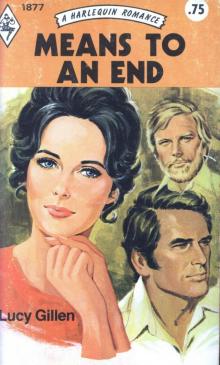 Means to an End
Means to an End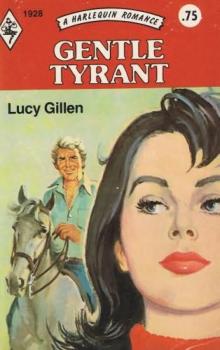 Gentle Tyrant
Gentle Tyrant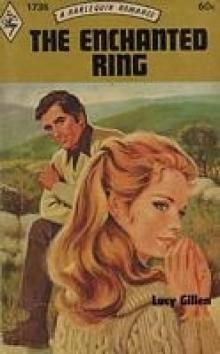 The enchanted ring
The enchanted ring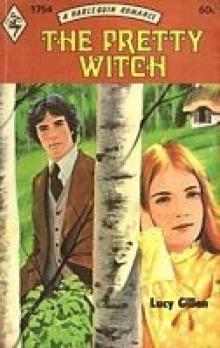 The pretty witch
The pretty witch The Runaway Bride
The Runaway Bride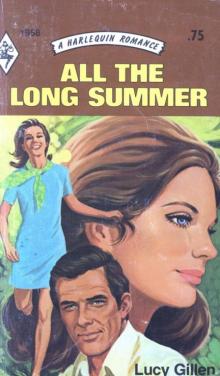 All the Long Summer
All the Long Summer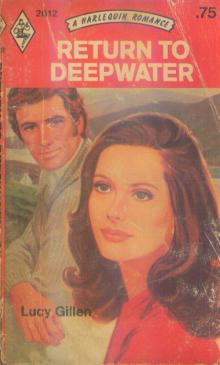 Return to Deepwater
Return to Deepwater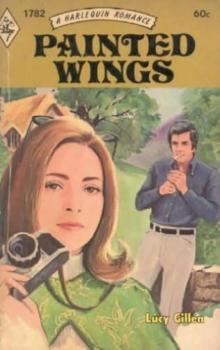 Painted Wings
Painted Wings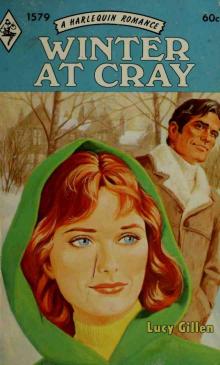 Winter at Cray
Winter at Cray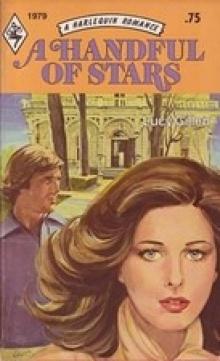 A handful of stars
A handful of stars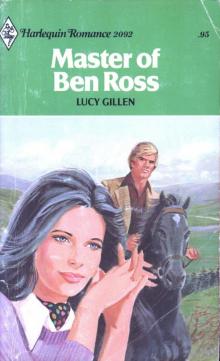 Master of Ben Ross
Master of Ben Ross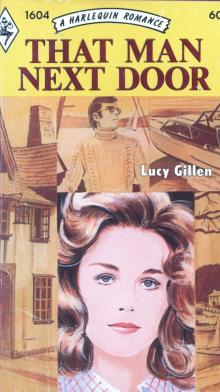 That Man Next Door
That Man Next Door